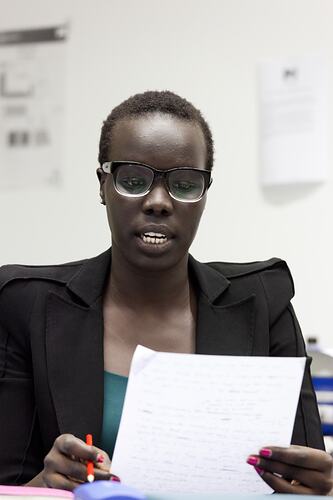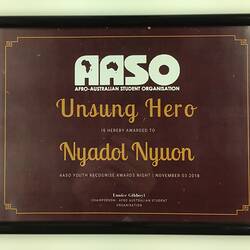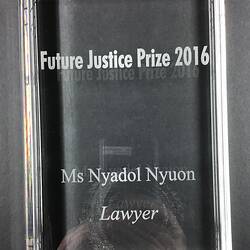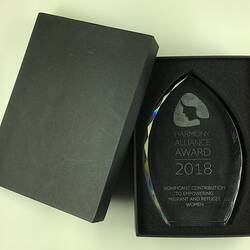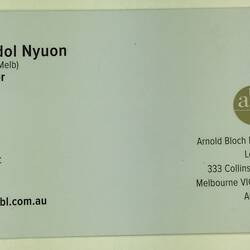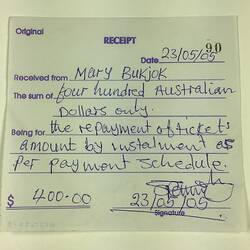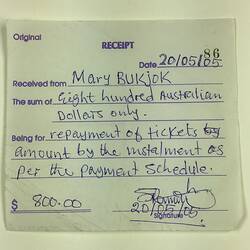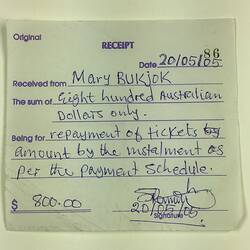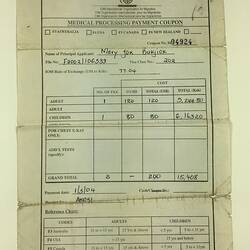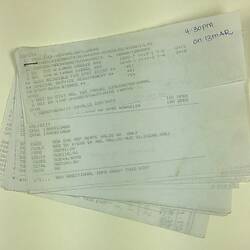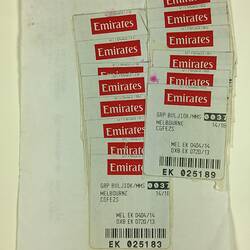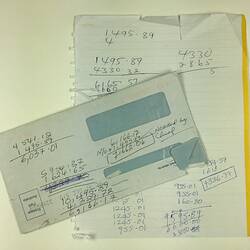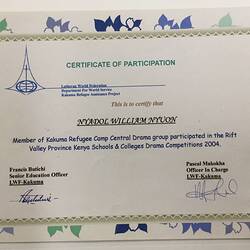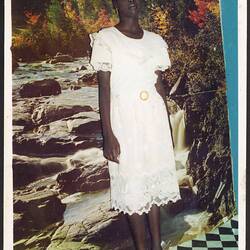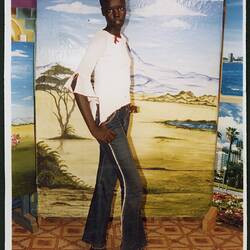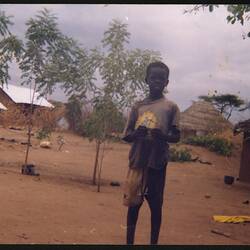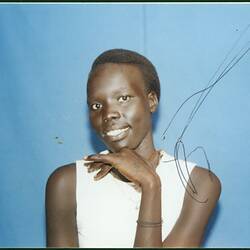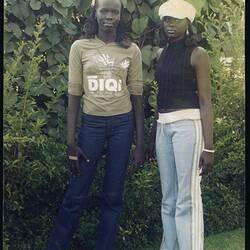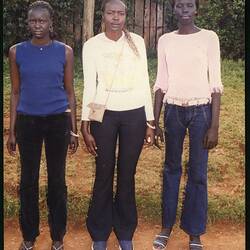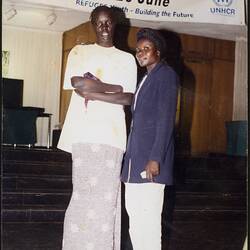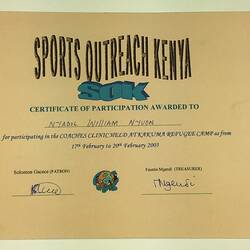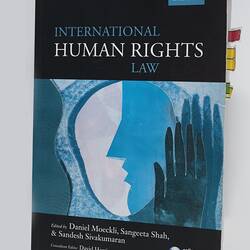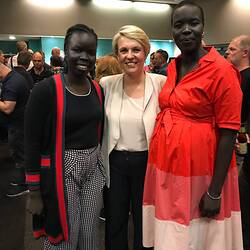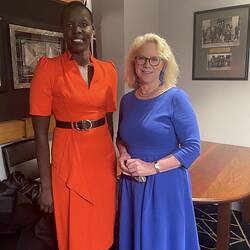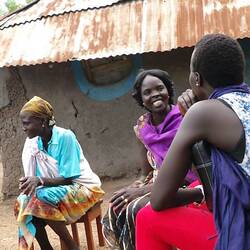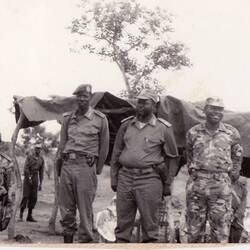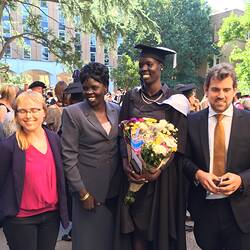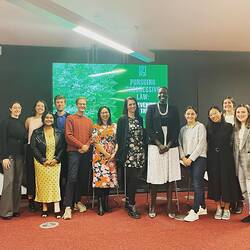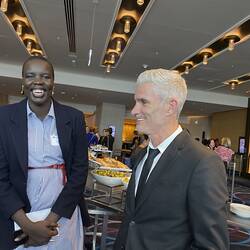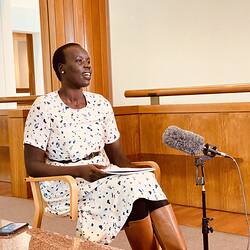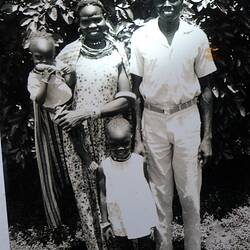Summary
Nyadol Nyuon OAM is a former refugee and now Australian human rights academic, lawyer, writer, media commentator and advocate.
Introduction:
In 2022, Nyadol Nyuon, OAM, Australian human rights academic, lawyer, writer, media commentator and advocate donated to the Museum a collection of objects, documents and photographs telling the story of her life from refugee camps in Ethiopia and Kenya to her migration, education, career and public life in Australia.
The collection includes: financial documents relating to the Nyuon family's migration process, travel to Australia, and early housing; Nyadol's refugee camp activities certificates; material relating to Nyadol's academic and employment activities; humanitarian awards; the dress she wore when delivering her National Press Club speech in Canberra in 2021 and an annotated copy of the original speech; and a portrait of her father, Commander William Nyuon Bany; digital photographs documenting her refugee camp, family, education and public life.
Early Years:
Nyadol was born in 1987 in the Itang refugee camp in Ethiopia, the daughter of Sudanese parents, her father William Nyuon Bany, one of the founders of the Sudan People's Liberation Army. The family had fled the ongoing civil war in South Sudan but had to return there due to conflict in Ethiopia, the family walking for forty days to get there. She was soon separated from her mother Mary Jock Bukjock and rarely saw her father who was away fighting. By the time Nyadol was seven years old, she was living with her father's relatives in Nairobi, Lodwar and Kakuma refugee camp, all in Kenya.
Here Nyadol attended school in cramped and difficult circumstances, made even harder for her as a girl. It was at this time that her dream to pursue a law career was ignited, fuelled by experiencing the importance of social justice in her every day life and witnessing the work of UNHCR lawyers. She was extremely active in a variety of educational activities, receiving many certificates for participating in sports, writing, drama and leadership programs.
After Nyadol's father died in 1996, her mother Mary Jock Bukjock relocated her entire family, including Nyadol's six brothers and sisters, from Ethiopia to Kakuma. It became increasingly evident that opportunities for the children, especially the daughters, would be limited, so Mary persuaded a family friend to sponsor their migration to Australia.
Migration to Australia:
The family of ten arrived in Melbourne in 2005 via the Australian Government's refugee and humanitarian program when Nyadol was 17 years old. They came with nothing, received little government support and Mary had substantial loans to repay. They lived in share houses and attended local schools in Melbourne's outer south-east. Nyadol reflects: 'When you arrive as a refugee, you really have nothing - no history in the new country, no savings, no family members with established businesses. You really are on your own. And sometimes you are expected to support your family, rather than have parents supporting you.' (Nyadol Nyuon's journey to justice, University of Melbourne Alumni webpage, sourced: 6 September 2022)
Education & Career:
It was a difficult time for Nyadol, feeling the pressure of low expectations for refugees - but yet she completed her VCE and was accepted into Victoria University. Nyadol completed her arts degree and gained admission in 2010 to Melbourne University's law school (Juris Doctor [JD] program). She remembers opening that letter as one of the happiest days of her life. She also received in 2013 the Eleanor and Joseph Wertheim Scholarship which Nyadol acknowledges made a critical difference in her being able to achieve her degree. She graduated in 2015 and the following year Nyadol was recruited by prominent law firm Arnold Bloch Leibler in Melbourne. She had undertaken a one month clerkship and a graduate year at Bloch and then received the offer to join their litigation practice group.
In 2021, Nyadol decided to leave the world of corporate law and is now the Executive Director of the Sir Zelman Cowan Centre at Victoria University which provides legal education, training and research with a focus on law and cultural diversity. Nyadol reflects: 'As important as it is to have a sense of identity, it is also important to be prepared to lose an identity you have cultivated and nourished... For a long time I was that 14-year-old girl in a refugee camp thinking I was going to be a lawyer. And it took a bit of courage to say, "Now it's time to let go of that identity and grow into another." (2022)
Human Rights Advocacy:
During her university years, Nyadol was already active in community advocacy, particularly in relation to African communities in Australia at a time when some political and media commentary was negative and inflammatory. Her leadership and communication skills became increasingly evident and Nyadol was invited to speak about social justice and racism issues on various high profile programs such as Q&A and The Drum on the ABC. Her appearance on Q&A in 2020 resulted in further abusive messages on social media - these kind of attacks are common for Nyadol as the cost of speaking out, and racism an ongoing trauma for her. Nyadol has also written opinion pieces in 'The Age', 'Sydney Morning Herald', 'The Saturday Paper' and 'The Guardian', and in 2019 she wrote a chapter for 'Growing Up African in Australia' edited by Maxine Beneba Clarke (Black Inc).
It was not long before Nyadol was receiving local and national recognition for her advocacy work, receiving, amongst others, a Victorian Multicultural Awards for Excellence and the Australian Human Rights Commission anti-racism award. In June 2021 she delivered a speech, 'Australia Reimagined', in her role as chair of Harmony Alliance: Migrant and Refugee Women for Change (a national coalition of migrant and refugee women in Australia), at the National Press Club in Canberra.
In 2021 Nyadol was nominated for the 2022 Australian of the Year Awards (won by disability advocate Dylan Alcott). She received the Medal of the Order of Australia (OAM) for 'service to human rights and refugee women' in 2022. She now has two children.
Nyadol feels ambivalent about receiving accolades and awards, both recognising the value of her visibility to inspire the next generation of refugees and people of colour in Australia, while also feeling uncomfortable with finding herself connected to Australia Day because of what that day symbolises for Indigenous Australians and being lauded for work that she believes to be essential and 'what anyone would do.'
Conclusion:
Nyadol Nyuon's story provides the opportunity to demonstrate the complexity of a person's multiple forms of identity (cultural, social, gender and work), and challenge social expectations placed on refugees and migrants which can see them categorised and subsequently defying those labels.
More Information
-
Keywords
-
Authors
-
Article types
